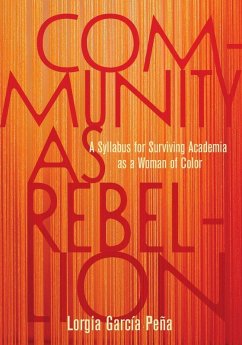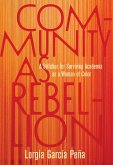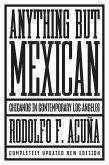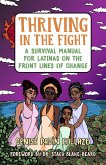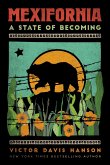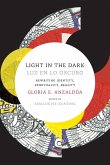19,99 €
inkl. MwSt.
Versandfertig in 2-4 Wochen

10 °P sammeln
- Broschiertes Buch
- Merkliste
- Auf die Merkliste
- Bewerten Bewerten
- Teilen
- Produkt teilen
- Produkterinnerung
- Produkterinnerung
A meditation on freedom-making in the academy for women scholars of color.
Andere Kunden interessierten sich auch für
![Community as Rebellion Community as Rebellion]() Lorgia Garca PeaCommunity as Rebellion54,99 €
Lorgia Garca PeaCommunity as Rebellion54,99 €![Slow and Sudden Violence Slow and Sudden Violence]() Derek HyraSlow and Sudden Violence34,99 €
Derek HyraSlow and Sudden Violence34,99 €![Anything But Mexican Anything But Mexican]() Rodolfo F AcunaAnything But Mexican21,99 €
Rodolfo F AcunaAnything But Mexican21,99 €![Thriving in the Fight: A Survival Manual for Latinas on the Front Lines of Change Thriving in the Fight: A Survival Manual for Latinas on the Front Lines of Change]() Denise CollazoThriving in the Fight: A Survival Manual for Latinas on the Front Lines of Change20,99 €
Denise CollazoThriving in the Fight: A Survival Manual for Latinas on the Front Lines of Change20,99 €![Unmastering the Script: Education, Critical Race Theory, and the Struggle to Reconcile the Haitian Other in Dominican Identity Unmastering the Script: Education, Critical Race Theory, and the Struggle to Reconcile the Haitian Other in Dominican Identity]() Sheridan WiggintonUnmastering the Script: Education, Critical Race Theory, and the Struggle to Reconcile the Haitian Other in Dominican Identity44,99 €
Sheridan WiggintonUnmastering the Script: Education, Critical Race Theory, and the Struggle to Reconcile the Haitian Other in Dominican Identity44,99 €![Mexifornia Mexifornia]() Victor Davis HansonMexifornia18,99 €
Victor Davis HansonMexifornia18,99 €![Light in the Dark/Luz en lo Oscuro Light in the Dark/Luz en lo Oscuro]() Gloria AnzalduaLight in the Dark/Luz en lo Oscuro27,99 €
Gloria AnzalduaLight in the Dark/Luz en lo Oscuro27,99 €-
-
-
A meditation on freedom-making in the academy for women scholars of color.
Hinweis: Dieser Artikel kann nur an eine deutsche Lieferadresse ausgeliefert werden.
Hinweis: Dieser Artikel kann nur an eine deutsche Lieferadresse ausgeliefert werden.
Produktdetails
- Produktdetails
- Verlag: Haymarket Books
- Seitenzahl: 120
- Erscheinungstermin: 31. Mai 2022
- Englisch
- Abmessung: 187mm x 129mm x 10mm
- Gewicht: 160g
- ISBN-13: 9781642596922
- ISBN-10: 1642596922
- Artikelnr.: 62352932
- Herstellerkennzeichnung
- Libri GmbH
- Europaallee 1
- 36244 Bad Hersfeld
- 06621 890
- Verlag: Haymarket Books
- Seitenzahl: 120
- Erscheinungstermin: 31. Mai 2022
- Englisch
- Abmessung: 187mm x 129mm x 10mm
- Gewicht: 160g
- ISBN-13: 9781642596922
- ISBN-10: 1642596922
- Artikelnr.: 62352932
- Herstellerkennzeichnung
- Libri GmbH
- Europaallee 1
- 36244 Bad Hersfeld
- 06621 890
Lorgia García Peña is a first generation Latinx Studies scholar. Dr. García Peña is the Mellon Associate Professor of Race, Colonialism and Diaspora Studies at Tufts University and a Casey Foundation 2021 Freedom Scholar. She studies global Blackness, colonialism, migration and diaspora with a special focus on Black Latinidad. Dr. García Peña is the co-founder of Freedom University Georgia and of Archives of Justice (Milan-Boston). Her book The Borders of Dominicanidad (Duke University Press 2016) won the 2017 National Women’s Studies Association Gloria Anzaldúa Book Prize, the Isis Duarte Book Award in Haiti and Dominican Studies and the 2016 Latino/a Studies Book Award. She is the author of Translating Blackness (Duke University Press) and the co-editor of the Texas University Press Series Latinx: The Future is Now. She is a regular contributor to The Boycott Times, Asterix Journal and the North American Council on Latin America (NACLA).
Table of Contents:
1. On being "the One": The first chapter relates the challenges of being
tokenized within the academy as a women of color scholar. The chapter
provides personal examples and posits a proposition to contrast the
individualistic model of success with one of community.
2. Complicity: This chapter lays out what the author considers a structure
of complicity that sustains unequal labor practices that systematically
affect women of color. Based on a series of interviews and autoethnographic
interventions, the chapter takes on tenure, labor appropriation, mentoring
as some of the main sites of complicity.
3. Freedom: This chapter proposes teaching as an act of freedom making and
offers practical examples of how to teach in/for freedom, how to create
communities that promote collective learning and engage in justice-making
practices in the classroom that can lead to long-term positive changes in
our society.
4. Ethnic Studies as Rebellion: This final chapter meditates on ethnic
studies as a critical site from which to fight against the hegemonic
practices of exclusion that uphold Eurocentric and Euro-American knowledge
as the only way to see the world while relegating knowledge that comes from
everywhere else to the periphery. The chapter is an invitation to rebel
through centering subjugated knowledge and the epistemologies of oppressed
peoples.
1. On being "the One": The first chapter relates the challenges of being
tokenized within the academy as a women of color scholar. The chapter
provides personal examples and posits a proposition to contrast the
individualistic model of success with one of community.
2. Complicity: This chapter lays out what the author considers a structure
of complicity that sustains unequal labor practices that systematically
affect women of color. Based on a series of interviews and autoethnographic
interventions, the chapter takes on tenure, labor appropriation, mentoring
as some of the main sites of complicity.
3. Freedom: This chapter proposes teaching as an act of freedom making and
offers practical examples of how to teach in/for freedom, how to create
communities that promote collective learning and engage in justice-making
practices in the classroom that can lead to long-term positive changes in
our society.
4. Ethnic Studies as Rebellion: This final chapter meditates on ethnic
studies as a critical site from which to fight against the hegemonic
practices of exclusion that uphold Eurocentric and Euro-American knowledge
as the only way to see the world while relegating knowledge that comes from
everywhere else to the periphery. The chapter is an invitation to rebel
through centering subjugated knowledge and the epistemologies of oppressed
peoples.
Table of Contents:
1. On being "the One": The first chapter relates the challenges of being
tokenized within the academy as a women of color scholar. The chapter
provides personal examples and posits a proposition to contrast the
individualistic model of success with one of community.
2. Complicity: This chapter lays out what the author considers a structure
of complicity that sustains unequal labor practices that systematically
affect women of color. Based on a series of interviews and autoethnographic
interventions, the chapter takes on tenure, labor appropriation, mentoring
as some of the main sites of complicity.
3. Freedom: This chapter proposes teaching as an act of freedom making and
offers practical examples of how to teach in/for freedom, how to create
communities that promote collective learning and engage in justice-making
practices in the classroom that can lead to long-term positive changes in
our society.
4. Ethnic Studies as Rebellion: This final chapter meditates on ethnic
studies as a critical site from which to fight against the hegemonic
practices of exclusion that uphold Eurocentric and Euro-American knowledge
as the only way to see the world while relegating knowledge that comes from
everywhere else to the periphery. The chapter is an invitation to rebel
through centering subjugated knowledge and the epistemologies of oppressed
peoples.
1. On being "the One": The first chapter relates the challenges of being
tokenized within the academy as a women of color scholar. The chapter
provides personal examples and posits a proposition to contrast the
individualistic model of success with one of community.
2. Complicity: This chapter lays out what the author considers a structure
of complicity that sustains unequal labor practices that systematically
affect women of color. Based on a series of interviews and autoethnographic
interventions, the chapter takes on tenure, labor appropriation, mentoring
as some of the main sites of complicity.
3. Freedom: This chapter proposes teaching as an act of freedom making and
offers practical examples of how to teach in/for freedom, how to create
communities that promote collective learning and engage in justice-making
practices in the classroom that can lead to long-term positive changes in
our society.
4. Ethnic Studies as Rebellion: This final chapter meditates on ethnic
studies as a critical site from which to fight against the hegemonic
practices of exclusion that uphold Eurocentric and Euro-American knowledge
as the only way to see the world while relegating knowledge that comes from
everywhere else to the periphery. The chapter is an invitation to rebel
through centering subjugated knowledge and the epistemologies of oppressed
peoples.
